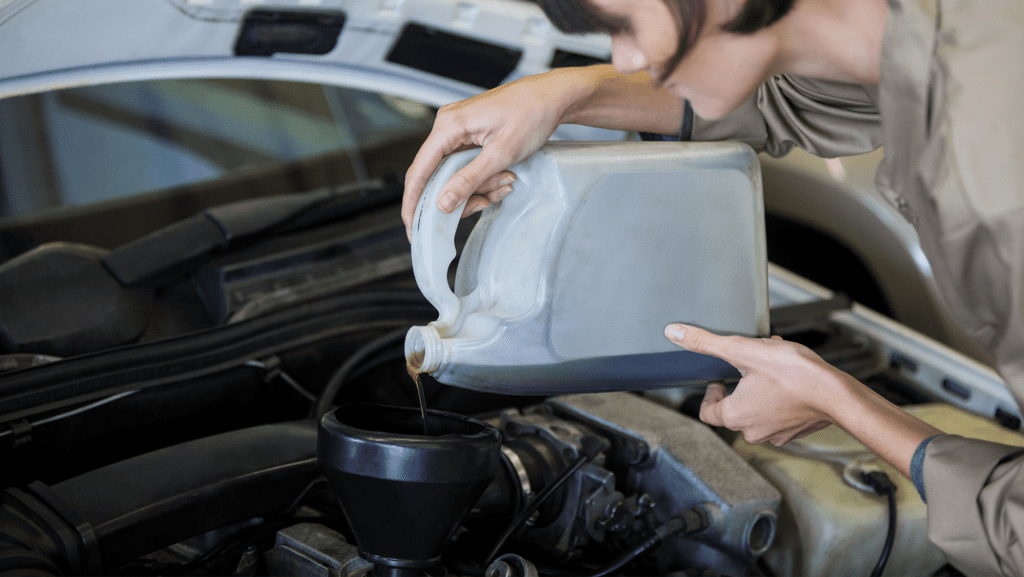Brake fluid plays a crucial role in your vehicle’s braking system by transmitting force and pressure to stop the wheels from spinning. It is essential to ensure that the brake fluid is clean, free of moisture, and at the right level to maintain optimal braking performance.
Regularly changing brake fluid is important as it helps to prevent contaminants and moisture from accumulating in the braking system. Moisture can corrode brake lines, calipers, and wheel cylinders, leading to reduced braking performance, which could compromise the safety of your vehicle.
Here’s a quick guide to help car owners change their brake fluid:
- Refer to your owner’s manual – Your vehicle’s manufacturer usually provides recommendations on how often you should change your brake fluid. Follow their instructions to ensure that you are changing the brake fluid at the appropriate intervals.
- Gather the necessary tools and equipment – To change your brake fluid, you will need a brake fluid reservoir, a wrench, a brake bleeding kit, and fresh brake fluid.
- Raise your vehicle – Use a jack to elevate your vehicle and secure it on jack stands.
- Locate the brake fluid reservoir – You usually find the brake fluid reservoir near the firewall under the hood.
- Remove the old brake fluid – Using the brake bleeding kit, remove the old brake fluid, starting from the furthest wheel away from the master cylinder.
- Refill with new brake fluid – Fill the brake reservoir with fresh brake fluid and use the brake bleeding kit to bleed the brakes until all the air bubbles are gone.
- Repeat the process – Repeat step 5 and step 6 for each wheel until all the old brake fluid has been replaced.
Changing your brake fluid is an essential maintenance task that should not be overlooked. Ensuring the optimal condition of your vehicle’s braking system is crucial for safe and reliable stopping power. You can achieve this by following these steps.
What is Brake Fluid and Why is it Important?
Brake fluid is a type of hydraulic fluid that is responsible for transmitting force and pressure from the brake pedal to the brake components, including the brake calipers and wheel cylinders. It is a vital component of your vehicle’s braking system, as it plays a crucial role in stopping your car.
Brake fluid is hygroscopic, which means that it absorbs moisture over time. As the brake fluid absorbs moisture, it becomes less effective at transmitting force and pressure, which can compromise the performance of your brakes. Additionally, old brake fluid can become contaminated with dirt, debris, and other contaminants, reducing its effectiveness.
Driving with old or contaminated brake fluid can lead to various problems, including:
- Reduced braking performance – When the brake fluid is old or contaminated, it can decrease your brakes’ effectiveness, leading to difficulty stopping your vehicle.
- Corrosion – Moisture can cause corrosion and rust in your brake lines, calipers, and wheel cylinders, leading to leaks and reduced performance.
- Brake failure – If your brake fluid is extremely old or contaminated, it can cause your brakes to fail completely, putting you and your passengers in danger.
Factors That Affect Brake Fluid Life
- Temperature: High temperatures can cause brake fluid to break down rapidly, reducing its effectiveness and increasing the risk of brake failure.
- Humidity: Humidity can cause moisture to accumulate in your braking system, leading to corrosion and reduced braking performance over time.
- Driving Conditions: Driving conditions, such as frequent stop-and-go traffic or driving on hilly terrain, can cause your brakes to work harder, which can lead to increased wear and degradation of your brake fluid.
Temperature, humidity, and driving conditions can all impact the quality of your brake fluid in different ways. High temperatures can cause the fluid to boil, leading to the formation of air bubbles, which can reduce braking performance. Moisture can cause rust and corrosion, which can damage brake lines and other components. Frequent use of your brakes can cause the fluid to break down more quickly, reducing its effectiveness over time.
Tips for Car Owners to Minimize the Impact of These Factors
To minimize the impact of these factors on your brake fluid, you can take the following steps:
- Park your vehicle in a cool, dry place whenever possible to reduce exposure to high temperatures and humidity.
- Use a brake fluid tester to monitor the condition of your brake fluid regularly.
- Avoid driving in stop-and-go traffic or on hilly terrain whenever possible to reduce wear on your brakes.
- Replace your brake fluid at the recommended intervals or more frequently if you frequently drive in extreme conditions.
How often should you change your brake fluid?
Maintaining clean and fresh brake fluid is essential for the proper functioning of your vehicle’s braking system. However, the frequency with which you should change your brake fluid depends on several factors, including manufacturer recommendations and driving conditions. By following these guidelines, you can ensure that your brakes are working correctly and safely, providing you with peace of mind on the road.
Manufacturer Recommendations
Most manufacturers recommend changing your brake fluid every two years or 24,000 miles, whichever comes first. Nonetheless, this can differ based on the make and model of the vehicle. Some manufacturers recommend changing the brake fluid more frequently or less frequently, depending on the specific requirements of the braking system.
To determine the manufacturer’s recommendations for your vehicle, refer to your owner’s manual or consult with a certified mechanic. Following these recommendations can help ensure that your braking system is functioning correctly and safely.
Driving Conditions
Driving conditions can also impact how often you should change your brake fluid. Driving in extreme conditions like stop-and-go traffic or mountainous terrain can lead to increased wear and tear on your brakes, especially if it’s a frequent occurrence.
Examples of driving conditions that may require more frequent brake fluid changes include:
- Frequent or heavy towing
- Racing or performance driving
- Driving in mountainous terrain
- Frequent stop-and-go traffic
To adjust your brake fluid change frequency based on driving conditions, consider consulting with a mechanic or referring to your owner’s manual. Regularly monitoring your brake fluid levels and quality can also help you determine when it’s time for a change.
Signs That Your Brake Fluid Needs to Be Changed
- Check your owner’s manual for recommended intervals
- Monitor the color and clarity of your brake fluid
- Use a brake fluid tester to check the moisture content of your brake fluid
- Consult with a certified mechanic to determine the best interval based on your driving habits and conditions
Determining how often you should change your brake fluid depends on several factors, including manufacturer recommendations and driving conditions. By following these recommendations and monitoring your brake fluid regularly, you can help ensure that your braking system is functioning correctly and safely.
Trust HEART Auto Care for Safe and Reliable Brake Fluid Changes
When it comes to brake fluid changes, there’s no room for error. Your vehicle’s braking system is one of the most critical safety features, and you need to ensure that it’s functioning correctly at all times. That’s why you need a trusted partner like HEART Auto Care for all your brake fluid change needs.
At HEART Auto Care, we understand the importance of maintaining clean and fresh brake fluid in your vehicle’s braking system. Our experienced and certified mechanics have the knowledge and expertise to perform brake fluid changes quickly and efficiently, ensuring that your brakes are operating safely and reliably.
We follow manufacturer recommendations for brake fluid change intervals and adjust those intervals based on your specific driving conditions. This approach ensures that your braking system is getting the care and attention it needs to function correctly and safely.
When you bring your vehicle to HEART Auto Care for a brake fluid change, you can expect:
- A thorough inspection of your braking system
- Top-quality brake fluid products
- Expert care and attention from our certified mechanics
- Competitive pricing and transparent billing
In addition to brake fluid changes, we offer a range of other brake-related services, including brake inspections, repairs, and replacements. No matter what your braking system needs, we have the knowledge and expertise to deliver exceptional results.
Don’t take chances with your vehicle’s braking system. Trust the experts at HEART Auto Care for safe and reliable brake fluid changes. Contact us today to schedule an appointment and experience the peace of mind that comes with working with the best.
Bottom Line
Regularly changing your brake fluid is essential for maintaining safe and reliable braking performance. Over time, brake fluid can become contaminated with moisture and other contaminants, reducing its effectiveness and potentially compromising your safety on the road.
To ensure that your braking system is functioning correctly and safely, it’s important to follow manufacturer recommendations for brake fluid change intervals and adjust those intervals based on your driving conditions. By monitoring your brake fluid regularly and addressing any issues promptly, you can avoid costly repairs and keep yourself and your passengers safe on the road.
If you are unsure when your brake fluid was last changed, or if you suspect that there may be an issue with your brakes, we encourage you to check your brake fluid and address any issues promptly. This small step can have a significant impact on the safety and reliability of your vehicle.
In conclusion, regularly changing your brake fluid is an essential maintenance task that should not be overlooked. By following these guidelines and taking care of your braking system, you can ensure that your vehicle is operating safely and reliably, providing you with peace of mind on the road.





